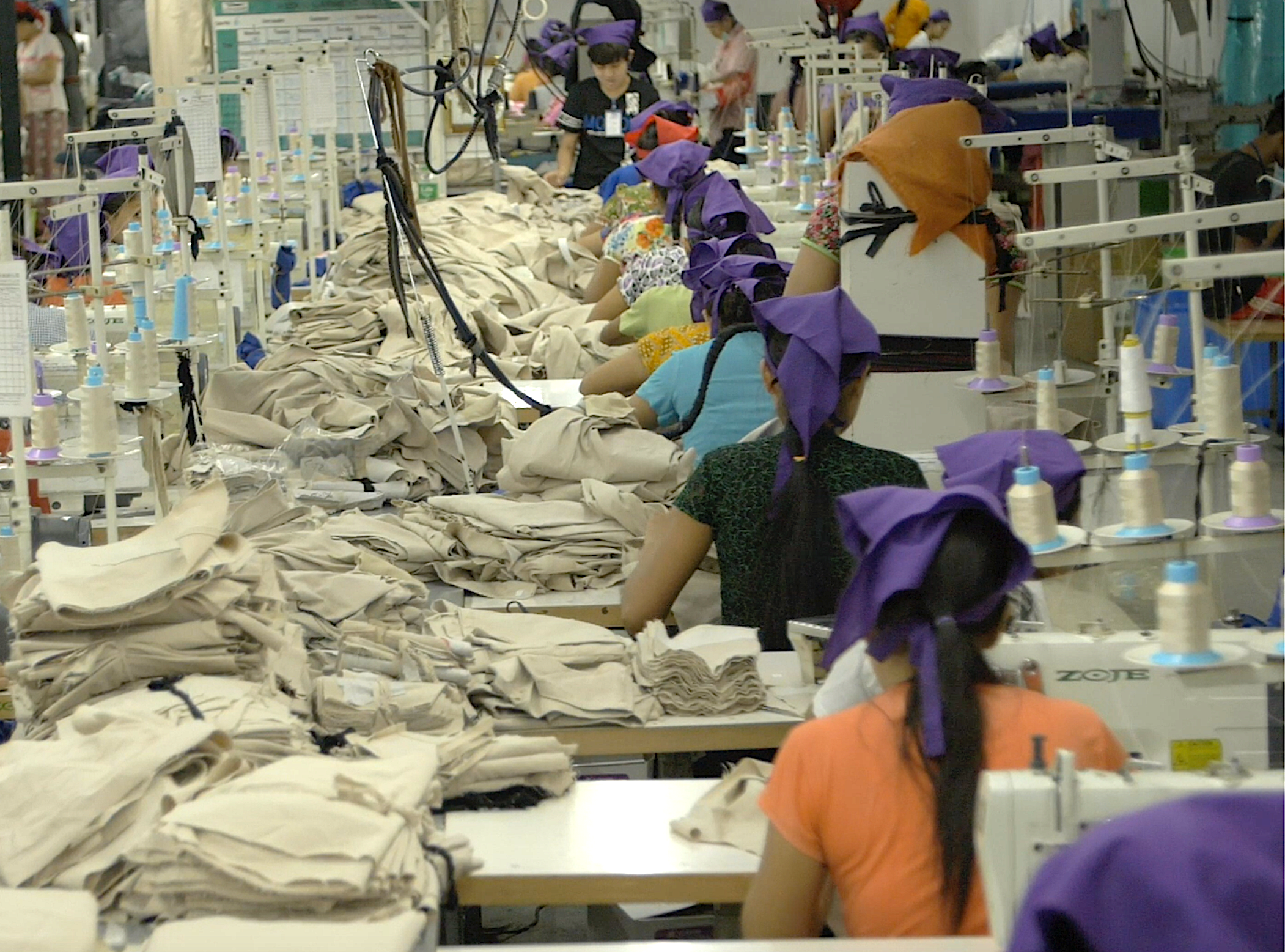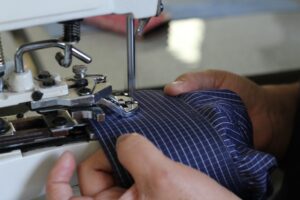Myanmar’s garment industry experienced nearly a decade of dramatic growth prior to the outbreak of the global COVID-19 pandemic, creating billions of dollars in export revenue and generating hundreds of thousands of new jobs. However, according to reports from the International Labor Organization (ILO), the U.S. State Department, and civil society organizations, this boom may have come at the expense of worker safety and wellbeing.
Beginning in 2016, spurred by those reports, which detailed child labor and abusive labor conditions, Transparentem conducted a two-part, three-year investigation. That investigation looked closely at three garment factories, and uncovered evidence of practices that appeared to violate international human rights standards and Myanmar law.
Transparentem investigators spoke directly with dozens of workers, a majority of whom were younger than 18. These workers described the conditions faced within their workplaces, including hazardous working conditions and abuses of their vulnerability. Workers described how they relied on excessive overtime or workplace loans from their supervisors or others in order to survive, and how families relied on minors working to help sustain their families instead of going to school. Workers also described instances of deception during social audits intended to monitor conditions for workers, raising questions about whether buyers are fully aware of their suppliers’ troubling practices.
Transparentem provided the results of the investigation to seven apparel companies identified as appearing to have products produced at one or more of the three factories. All seven companies took some form of action, with six companies pursuing factory-level improvements. These six companies conducted their own follow-up assessments of the investigated factories and provided some details of their remediation plans with Transparentem. Two companies also leveraged their partnership with SMART Myanmar to focus on industry collaboration.
Despite some resulting improvement goals on specific issues at each factory, such as enhanced age verification, stronger health and safety protections, and better wage documentation, much work remains to ensure that progress is sustainable both within facilities and across the wider industry. This is particularly true now, as the COVID-19 pandemic has brought a contraction of the Myanmar garment industry and further reports of widespread abuse.
Investigative Findings
Child Labor and 14- and 15-year-olds Employed Beyond Legal Restrictions: Some workers who said they were 14 and 15 described working in excess of four hours, the maximum shift length workers this age were permitted to work under Myanmar law at the time of the investigation. Workers also said managers did not properly verify the ages of job applicants and hired individuals with fake or borrowed identity documents. A few workers who said they were hired before turning 16 stated they did not need to show any identification when they applied. “I got hired when they were short of workers,” one of these workers said. “They didn’t even look at my ID. They hired me right there.” Transparentem also spoke with some workers in two of the factories who said they were 13 or younger at the time of their interviews. Employing children under 14 in factories is illegal in Myanmar. Companies told Transparentem that they could not confirm these findings.
Hazardous Labor: Transparentem found evidence that workers, including two children under age 14 at one factory, stuffed garments with down feathers, and that management only gave workers thin, inadequate masks. Workers said high workplace temperatures made it difficult to wear the masks without discomfort and they did not regularly use them. Exposure to fine organic dust from down feathers can cause short-term health problems and permanent lung damage, risks which are elevated for children.
Wage and Overtime Violations: Workers at all factories said managers sometimes required them to work against their will, or, at two factories, without pay. One worker noted that workers “have no options” to refuse overtime work and that the absence rate for unpaid overtime was low because “workers are afraid that they will get scolded.” Some workers said they were required to work part of or all day on Sundays—a day of rest under Myanmar law—without compensation. One worker stated: “I never got paid for working on Sundays. If I can’t finish my tasks in time, they note them down and make me work [overtime] instead. If I don’t want to work [overtime], then I get scolded and they do swear.”
Inadequate Documentation: Workers said management did not provide them with pay slips they could understand or use to calculate their pay. Workers also identified problems with their employment contracts, or the way the factory communicated the terms of their employment. Some were not given copies of their labor contract; others were made to sign a contract without having its terms explained to them.
Workplace Loans and Debt: Workers told Transparentem they borrowed money with interest from other employees, including supervisors and security guards. Such loans, particularly from factory staff with supervisory authority, are a potential source of coercion.
Additional Findings
In addition to these findings, Transparentem’s investigation uncovered evidence of two other systemic problems that may impede companies’ ability to detect and remediate labor violations at the factories:
Inadequate Grievance Systems: Workers at two factories were either unaware of grievance mechanisms available to them or skeptical that such avenues were safe and effective. This suggests that factory managers have failed to provide appropriate grievance mechanisms or have not adequately informed workers of the existence of such mechanisms. It may also indicate that grievance hotlines planned following company-contracted audits were not effectively designed and implemented.
Audit Deception: Workers at all three factories told Transparentem that factory managers concealed underage workers and others from auditors by hiding them or sending them home during audits. One worker told Transparentem, “When the auditors come in, they can make a fuss and say these kids are too young. On the days we are audited, [managers] send them back [home].” Workers at two factories also said managers instructed workers to lie to auditors, and in some cases, coached them on how to do so.
Buyer Responses
All seven companies took some form of action. The six companies that conducted factory audits as a result of this investigation shared “factory improvement goals” resulting from those audits that align with Transparentem’s findings. Improvement goals for all factories included improving wage documentation procedures, and enhancing age verification, although companies also told Transparentem they could not verify the presence of workers under the age of 18 in the facilities.
For some factories, improvement plans included additional measures such as improved health and safety protections, better mechanisms to ensure overtime is voluntary, and improved practices around contracts and workplace loans. Some improvement plans also included remedies to issues not found in Transparentem’s initial investigation, such as ensuring freedom of movement for workers and the provision of paid leave and severance payments as required by law.
Factory Responses
When Transparentem contacted the suppliers for comment, representatives from two factories confirmed they had been working with a third-party auditor contracted by the companies to make improvements. One factory did not mention any audits, but said the facility “conduct[s] and control[s] all the working activities strictly under Myanmar law.” Another factory stated that, after taking steps recommended by the audit firm, it ceased production before the end of 2019.
Conclusion
Myanmar’s foray into the global economy after decades of isolation and military rule creates a complicated business environment, plagued by widespread reports of worker exploitation. At the same time, as this report was going public, Myanmar’s garment industry faced severe disruptions as a result of the global COVID-19 pandemic. By the end of April 2020, more than 60,000 garment workers were unemployed and 175 factories had ceased operations.
The growth of Myanmar’s garment industry, prior to the emergence of the pandemic, represented a moment of opportunity for hundreds of thousands of Burmese workers. As the COVID-19 crisis exacerbates the existing vulnerabilities among the workforce in Myanmar, much is left to be done to ensure that progress is sustainable. With appropriate human rights due diligence, pro-active systems to assess suppliers’ commitment to workers’ rights, and robust systems to detect audit deception, it is possible to do business responsibly in Myanmar.
Over the long term, buyers, working alongside the government and local civil society, must invest in building strong, dedicated, strategic partnerships with their Myanmar suppliers to develop principled international labor rights standards. Buyers and those interested in business opportunities in Myanmar should assess and address their risks prior to conducting official business, and should develop ongoing, worker-inclusive monitoring and dialogue in partnership with credible, independent, local organizations.
Ensuring human rights and good governance in the Burmese apparel industry will take a concerted effort by multiple stakeholders. Major clothing companies should reassess their role in ensuring safer worker conditions, better jobs, and fair wages. Critical labor issues, such as those outlined in our report, require that international apparel buyers practice innovative and sustained vigilance. Companies should collaborate with their suppliers, local civil society groups, worker representatives, and unions to raise standards in all garment facilities.
More Information
See also this Just-Style article about our work in Myanmar for additional information about this project. For further information, you can also also contact info@transparentem.org.




